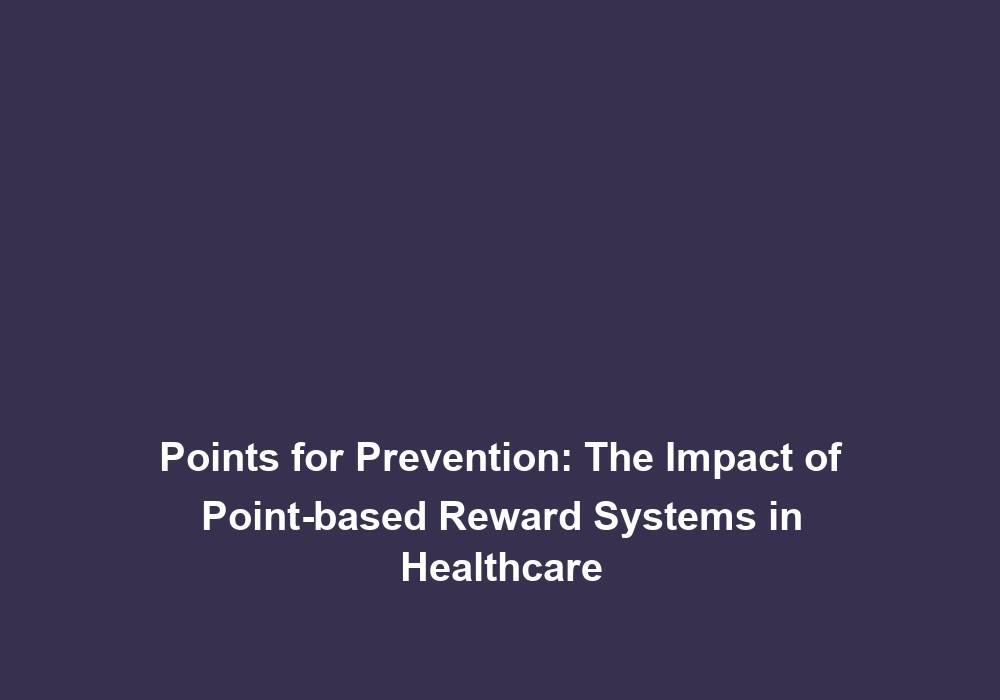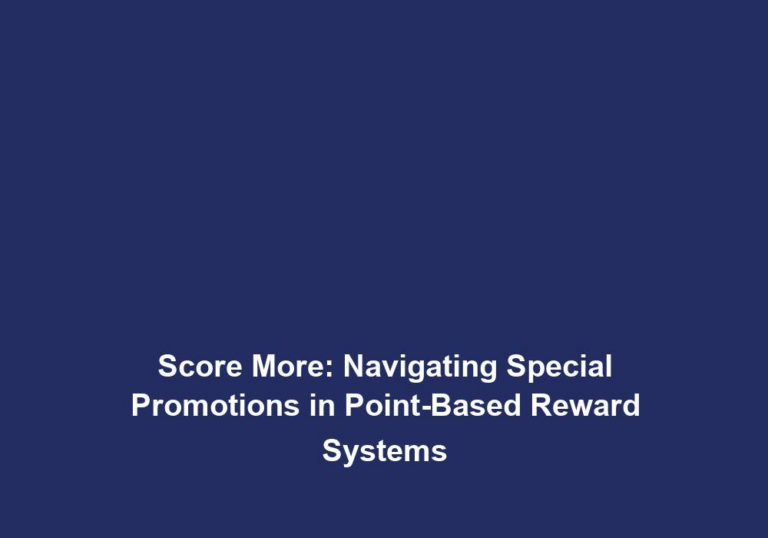Points for Prevention: The Impact of Point-based Reward Systems in Healthcare
In recent years, the healthcare industry has witnessed a growing interest in point-based reward systems as a means to encourage preventive healthcare practices and improve overall patient well-being. These innovative systems offer incentives to individuals for engaging in healthy behaviors, such as regular exercise, adherence to medication, and preventive screenings. This article explores the impact of point-based reward systems in healthcare, discussing their benefits, challenges, and potential for driving positive health outcomes.
What are Point-based Reward Systems?
Point-based reward systems in healthcare operate on the principle of incentivizing healthy behaviors through the accumulation of points. Individuals earn points by participating in specific activities or achieving predefined health goals. These points can then be redeemed for various rewards, such as discounts on healthcare services, gift cards, or merchandise.
Benefits of Point-based Reward Systems
- Increased Engagement in Preventive Healthcare
One of the primary benefits of point-based reward systems is their ability to motivate individuals to engage in preventive healthcare practices. By offering tangible rewards, these systems encourage individuals to take proactive steps towards maintaining their health and well-being. For instance, a person may be more inclined to schedule regular check-ups or screenings if they know they can earn points that can later be redeemed for desirable rewards.
In addition, point-based reward systems can increase awareness about the importance of preventive healthcare. When individuals are incentivized to participate in activities such as exercise, regular check-ups, and screenings, they become more conscious of their health and are more likely to adopt preventive measures. This increased engagement in preventive healthcare can lead to early detection of health issues and a reduction in the overall burden on the healthcare system.
Furthermore, point-based reward systems can help foster a sense of personal responsibility for one’s health. By actively participating in preventive healthcare activities and earning points, individuals feel a sense of accomplishment and empowerment. This positive reinforcement can further motivate them to continue practicing healthy behaviors and taking charge of their well-being.
- Enhanced Adherence to Medication and Treatment Plans
Adherence to medication and treatment plans is crucial for effectively managing chronic conditions and preventing complications. Point-based reward systems can play a significant role in improving medication adherence by incentivizing individuals to follow their prescribed regimens. By offering points for medication adherence, individuals are more likely to take their medications as prescribed, leading to better health outcomes.
In addition to medication adherence, point-based reward systems can also promote adherence to other treatment plans, such as physical therapy exercises or dietary restrictions. By rewarding individuals for following their treatment plans, these systems reinforce the importance of sticking to the prescribed guidelines, ultimately leading to improved health outcomes and better disease management.
Moreover, point-based reward systems can help individuals develop a habit of regular and consistent medication intake. By earning points for each medication taken, individuals are encouraged to establish a routine and incorporate medication adherence into their daily lives. This habit formation can have long-term benefits in managing chronic conditions and preventing medication-related complications.
- Reinforcement of Positive Behaviors
Point-based reward systems have the power to reinforce positive behaviors and habits. For example, if someone earns points for engaging in regular exercise or maintaining a healthy diet, they are more likely to continue these behaviors in the long run. This positive reinforcement can contribute to the adoption of healthier lifestyles, leading to improved overall health and well-being.
In addition to exercise and diet, point-based reward systems can also encourage individuals to engage in other positive behaviors, such as stress management techniques or smoking cessation. By providing incentives for these behaviors, individuals are motivated to make positive changes in their lives, ultimately leading to better health outcomes and a reduced risk of chronic diseases.
Furthermore, point-based reward systems can promote social support and community engagement. When individuals earn points for participating in group activities or attending wellness events, they are more likely to connect with like-minded individuals and form supportive networks. This social support can provide motivation, accountability, and a sense of belonging, further reinforcing positive behaviors and enhancing overall well-being.
- Data Collection and Insights
Implementing point-based reward systems in healthcare allows for the collection of valuable data on individual health behaviors and preferences. This data can be leveraged by healthcare providers and organizations to gain insights into patient populations, identify trends, and tailor interventions accordingly. By analyzing the data collected through these systems, healthcare professionals can make informed decisions and develop targeted strategies to improve health outcomes.
The data collected through point-based reward systems can provide valuable information about the effectiveness of specific interventions and programs. By tracking individual participation, engagement, and outcomes, healthcare providers can assess the impact of different incentives and adjust their strategies accordingly. This data-driven approach can lead to more personalized and effective interventions, ultimately resulting in better health outcomes for individuals and populations.
Moreover, the data collected through point-based reward systems can contribute to the development of evidence-based practices in preventive healthcare. By analyzing the aggregated data from a large number of individuals, researchers can identify patterns, correlations, and predictors of health behaviors. This knowledge can inform the design of future interventions and guide healthcare policies aimed at promoting preventive healthcare practices.
Challenges and Considerations
While point-based reward systems have numerous benefits, there are also challenges and considerations that need to be addressed for their successful implementation and sustainability.
- Designing Effective Incentives
To ensure the success of point-based reward systems, it is crucial to design incentives that are meaningful and appealing to individuals. The rewards should align with their preferences and motivate sustained engagement. Conducting research and gathering input from the target population can help in determining the most effective incentives.
In addition to choosing the right incentives, it is important to consider the timing and frequency of rewards. Offering incentives too frequently or making them too easily attainable can diminish their value and reduce motivation. On the other hand, setting rewards that are too difficult to achieve may discourage participation. Striking the right balance is essential to maintain individuals’ interest and engagement in the point-based reward system.
- Addressing Equity Concerns
Incentive programs should be designed in a way that does not exacerbate existing health disparities or create inequitable access to rewards. It is essential to consider the diverse needs and socio-economic factors of the target population and ensure that the incentive system is inclusive and accessible to all individuals, regardless of their background or resources.
To address equity concerns, it may be necessary to offer a variety of reward options that cater to different preferences and lifestyles. This can help ensure that individuals from diverse backgrounds can find incentives that are meaningful to them. Additionally, providing support and resources to individuals who may face barriers in participating in certain activities can help level the playing field and promote equal access to rewards.
- Maintaining Long-term Engagement
Sustaining long-term engagement is crucial for the success of point-based reward systems. To keep individuals motivated and engaged, it is necessary to periodically update and refresh the available rewards. Additionally, implementing strategies such as personalized goal-setting, progress tracking, and social support can help individuals stay committed to healthy behaviors.
Personalized goal-setting allows individuals to set meaningful targets that align with their specific health needs and aspirations. By tailoring goals to their preferences and capabilities, individuals are more likely to stay motivated and committed to achieving them. Progress tracking, whether through mobile apps or wearable devices, can provide individuals with visual feedback on their progress, reinforcing their efforts and encouraging them to continue.
Social support plays a crucial role in maintaining long-term engagement in point-based reward systems. By fostering a sense of community and providing opportunities for individuals to connect with others, healthcare providers can create a supportive environment that encourages participation and sustains motivation. This can be achieved through online forums, group activities, or peer-led support programs.
- Privacy and Data Security
Collecting and utilizing participants’ health data requires strict adherence to privacy and data security regulations. It is essential to implement robust measures to protect sensitive information and ensure compliance with relevant laws and regulations, such as the Health Insurance Portability and Accountability Act (HIPAA).
To safeguard privacy and data security, healthcare organizations should employ encryption and anonymization techniques when storing and transmitting data. Regular security audits and assessments should be conducted to identify and address vulnerabilities in the system. Additionally, obtaining informed consent from participants and providing transparency about data usage can help build trust and confidence in the point-based reward system.
Future Implications and Conclusion
Point-based reward systems have the potential to revolutionize preventive healthcare practices and improve patient outcomes. As technology continues to advance, these systems can be seamlessly integrated into healthcare apps, wearable devices, and other digital platforms, making them more accessible to a wider population. By effectively leveraging the power of incentives, data collection, and positive reinforcement, healthcare providers and organizations can empower individuals to take charge of their health and embrace preventive measures. Ultimately, the widespread adoption of point-based reward systems in healthcare has the potential to significantly transform healthcare delivery, leading to healthier communities and reduced healthcare costs.







